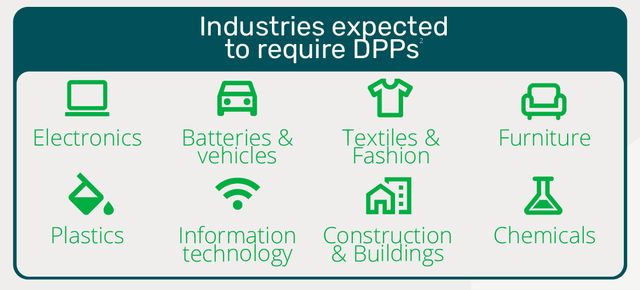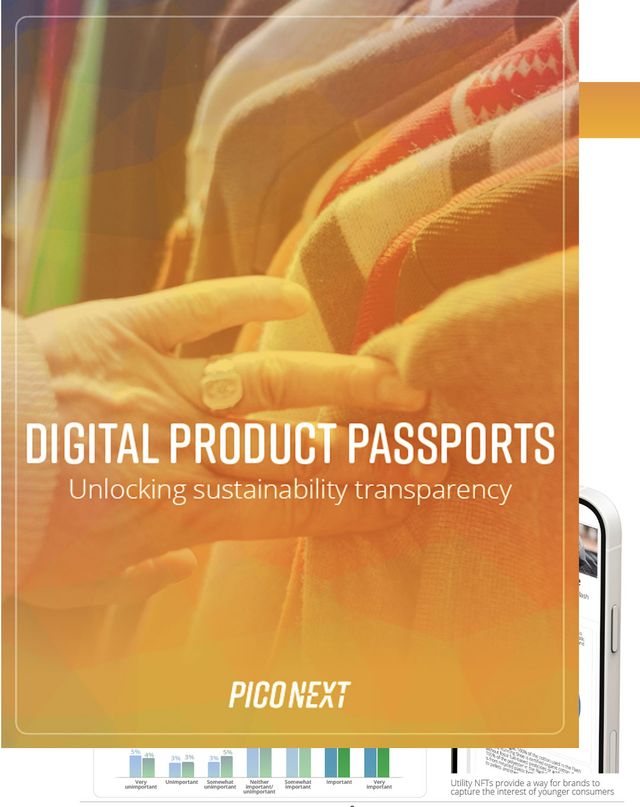The European Union has recently released a FAQ about Digital Product Passport guidelines (DPP), a key component of the recently finalised Ecodesign for Sustainable Products Regulation (ESPR). DPPs aim to promote sustainability by providing detailed product information that can aid in recycling, reuse, and responsible consumption. This blog post summarises important answers from that FAQ to clarify how the DPP will work and what it means for businesses and consumers alike.
When will DPPs be required?
The exact timeline for when DPPs will be required will vary based on product categories. Guidelines and specific implementation dates will be outlined through upcoming “delegated acts”, which are follow-on pieces of legislation to the overall ESPR regulation that mandates DPPs.
These delegated acts will specify when DPPs must be implemented for a specific product category, what information should be included, and how customers should access the Digital Product Passport information. The first delegated act is expected to enter into force in 2027, which means that companies need to prepare ahead of then to comply with the regulations.
What products will require DPPs?
Digital Product Passports will be required for specific product groups, particularly those identified as having significant environmental impacts or being essential for circular economy practices. The specific product categories will be detailed in future regulation updates. Categories that are expected to require DPPs include:
- Information and communications technology (ICT)
- Electronics
- Batteries & vehicles
- Textiles / Fashion
- Plastics
- Furniture
- Construction and buildings
- Chemicals

Do products have to be certified based on their Digital Product Passport content?
Certification requirements could vary depending on the product category and the type of information that needs to be included in the DPP. Over the next few years, the EU will suggest specific guidelines for different product groups. In some cases, a third party might need to verify parts of the Digital Product Passport information.
Who defines what is included in a Digital Product Passport?
The contents of the DPP will be defined by the European Commission through the delegated acts mentioned previously. These acts will specify the relevant data points and requirements for various product categories to ensure clarity and consistency. In addition, some product categories may have other legislation that influences what’s required to report on in the Digital Product Passport, such as the proposed EU Toy Safety Regulation.
Will there be an EU-wide Digital Product Passport template?
Currently, there is no template that all companies must use for their DPPs. The EU is focusing on defining the content to be required in DPPs, versus a standard template to use. PicoNext customers, as part of the DPP Planner tool, have access to templates by product category that are updated according to evolving regulatory and product requirements.
What will be the environmental impact of the DPP itself?
Before finalising rules for each product group, the EU will conduct impact assessments on environmental costs, including aspects like data storage and transfer. The overall environmental impact of a Digital Product Passport will depend on what’s required to be reported on, the technology solution used, and other factors like the product scope level of the DPP (such as whether they are required for each item, model, or batch), and how many products are sold.
What is the EU's perspective on blockchain DPPs?
The EU takes a neutral stance on technology and hasn’t chosen a specific approach, such as blockchain, for DPP data storage. PicoNext supports both cloud-based DPPs (for ease of implementation) and blockchain-based DPPs (for increased transparency).
Learn more about PicoNext DPP capabilities
Are DPPs required to have a QR code?
The specifics of what kind of data carrier (like a QR code) will be required for the Digital Product Passport are still under discussion. These requirements will be detailed in future legislation for particular product groups.
How do DPPs apply to parts/materials providers, and vice-versa with downstream manufacturers/distributors?
Digital Product Passports are designed to drive a circular economy and increase transparency. As such, the company placing the product on the market needs to ensure that upstream suppliers (providing parts and materials) are providing accurate and complete data, even if a DPP isn’t required for those component products. Suppliers must ensure that relevant data for the Digital Product Passport is passed along accurately, even if they are located outside the EU.
What about complex products with multiple components? Does each component require a DPP?
For complex products that have multiple components, if a component is covered by an EU delegated act, it will require a Digital Product Passport. Those individual component DPPs can be linked to the overall product DPP.
Does a DPP need to report on substances of concern?
Yes, DPPs will need to report on substances of concern as part of their content, if levels of the substance are above the thresholds set for in the category-specific delegated act. The delegated act may contain exemptions. This requirement reflects an emphasis on transparency and consumer safety.
How will Digital Product Passport enforcement happen?
Enforcement will be managed by market surveillance authorities in individual EU countries. They will verify that the DPPs are accurate, complete, and in line with regulations. Before a product is placed on the EU market, it will be required to have a global unique identifier and have its Digital Product Passport registered in a central registry. Companies that don’t comply with DPP requirements may be subject to penalties, which will be decided by each EU country, and which should be “effective, proportionate and dissuasive”, according to the ESPR legislation.

What about DPPs for products made outside the European Union?
Products manufactured outside the EU will also need a DPP when sold or distributed in the EU. The responsibility will fall on the economic operator (the party placing the product on the EU market) to ensure the product comes with a compliant Digital Product Passport.
How will the EU ensure that data is consistent across different countries?
To maintain consistency, the EU will implement a globally unique identifier for each product. It also envisions the possibility of automated checks of DPPs to ensure completeness.
Learn more
The Digital Product Passport represents a significant step towards improved product sustainability in the EU and beyond. With guidelines and frameworks evolving, businesses should stay informed and prepare for these forthcoming changes. PicoNext can help you gather information for your Digital Product Passport, publish it in the cloud or on a blockchain, and navigate other requirements – such as public/private data and item/batch-level requirements.
For more information, watch a demo of PicoNext or request a consultation.


